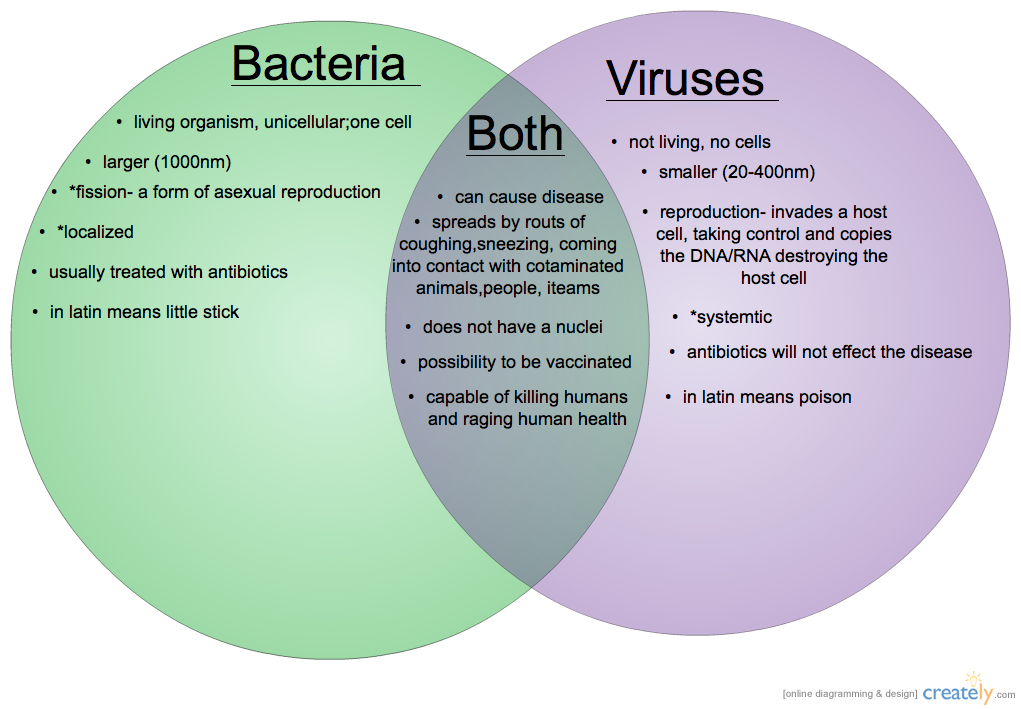Bacteria & Viruses: What is the Difference?
April 17, 2020 at 1:35 pm
Bacteria vs Virus Venn Diagram

Bacteria vs Viruses
There are not many similarities between viruses and bacteria. They are similar in terms of how they are spread but the biological and pathological differences are quite great. They can both cause diseases but bacteria can actually be beneficial to the health of humans and animals, unlike a virus that is always seen as harmful. Treatment of bacterial infections and viral infections also differ as viral infections cannot be treated with antibiotics.
Viruses
A virus is defined as a submicroscopic infective agent that has a nucleic acid molecule in a protein coat that can only multiply within the living host cells. Viruses can wreak havoc on the immune system especially when there is not a vaccine available as we are experiencing with the COVID-19 virus.
Characteristics of Viruses
- Viruses invade the body’s cells and ‘commandeer’ the cells ‘machinery’ to make copies of itself.
- Viruses have no metabolism and are considered essentially non-living by the above criteria.
- Antibiotics, in general, do not work on viruses because antibiotics typically work by disrupting a bacteria’s metabolism in some crucial way.
- Must be prevented with vaccines like a flu shot, social distancing, & maintaining a clean area.
Examples of Viruses
- COVID-19 (Coronavirus)
- SARS-CoV (better known as SARS)
- Ebola Virus
- HIV
- Chickenpox
- Measles
- Flu Virus
- Common cold
Bacteria
Bacteria are microscopic single-celled organisms that are classified as prokaryotes that lack a nucleus. Whether you know it or not bacteria is everywhere around you and even inside you! Not all bacteria are scary as the bacteria that live inside your gut help aid your digestive system.
Characteristics of Bacteria
- Bacteria have a functioning metabolism and have the basic hallmarks of life, i.e; reproduction, energy production, etc.
- Some bacteria are actually helpful to human health.
- Bacteria are as much as 50 to 100x larger than most viruses.
- Bacterial infections can be treated with Antibiotics.
Examples of Bacteria
- E. coli
- Salmonella
- Meningitis
- Spirillum
- Gut microbiota (the good kind)
- Bifidobacteria
- Lactobacilli
How is Bacteria Spread?
- Close contact such as touching or kissing
- Being exposed to bodily fluids of someone who is infected
- Parental transmission such as mother to baby during labor
- Touching contaminated surfaces then touching your face
Similarities Between Bacteria and Viruses
- Both viruses and bacteria can cause diseases.
- Both can be spread through coughing, sneezing, or coming into contact with contaminated surfaces, animals, items, or people.
- Both can possibly be treated with vaccines.
How are Viruses & Bacteria Spread?
One key similarity of viruses and bacteria share is the ways that they are spread.
Bacteria & viruses can both be spread by:
- Close contact such as touching or kissing
- Being exposed to bodily fluids of someone who is infected
- Parental transmission such as mother to baby during labor
- Touching contaminated surfaces then touching your face
- Bite of an infected insect
- Consuming contaminated food or water
Preventing Virus & Bacteria Transmission
It’s important to know how to protect yourself and others from contracting bacterial or viral infections. Many of us can receive vaccinations to help us fight off these diseases or have strong immune systems. There are some who cannot fight disease as easily such as those who are immunocompromised or are too young to receive a vaccination.
To prevent the spread of bacterial and viral infections you should:
- Wash your hands with soap and water
- Clean your surroundings regularly
- Cough or sneeze into your elbow
- Avoid contact with someone who is sick
- Avoid touching your eyes, nose, mouth
Virus & Bacteria Disinfecting & Cleaning
Ultra Pressure Cleaning is now offering commercial & residential virus disinfection & cleaning services to rid all kinds of surfaces of dangerous viruses and bacteria in South Florida. We use a Sodium Hypochlorite solution that is approved by the CDC, NIH, & WHO to kill viruses like COVID-19 (Coronavirus) & keep our community safe. With the introduction of electrostatic disinfection technology, our team can more accurately defend your home and business from viruses and bacteria.
Contact us to receive a free quote today!
